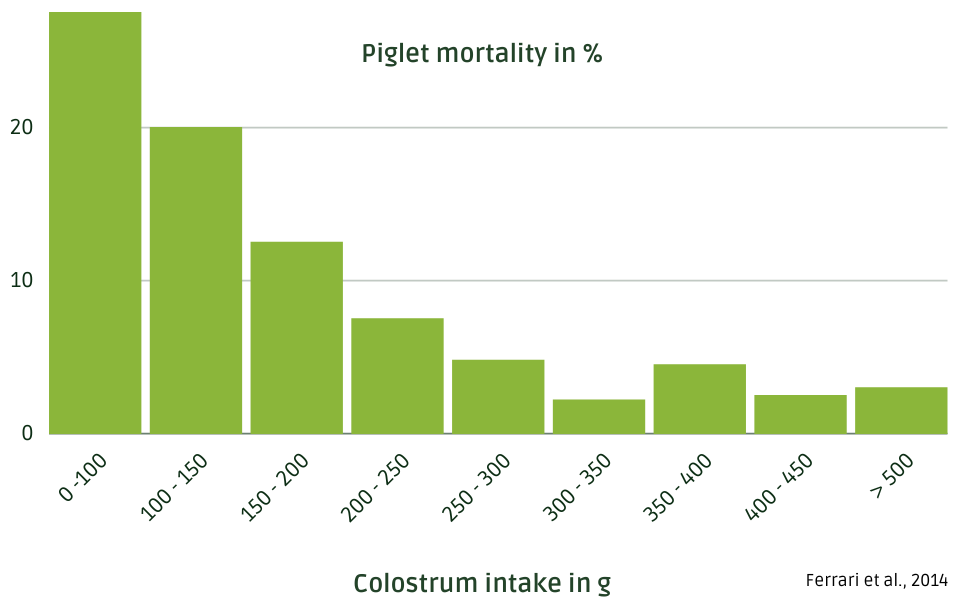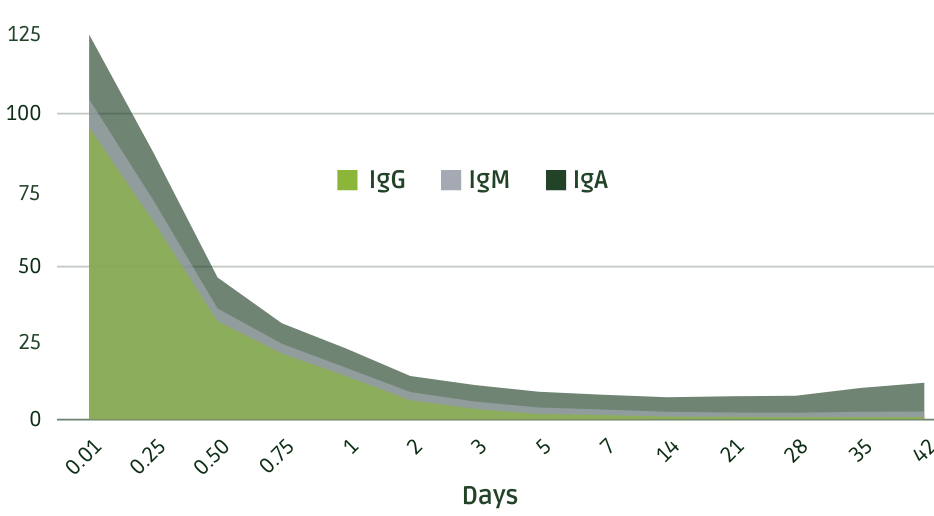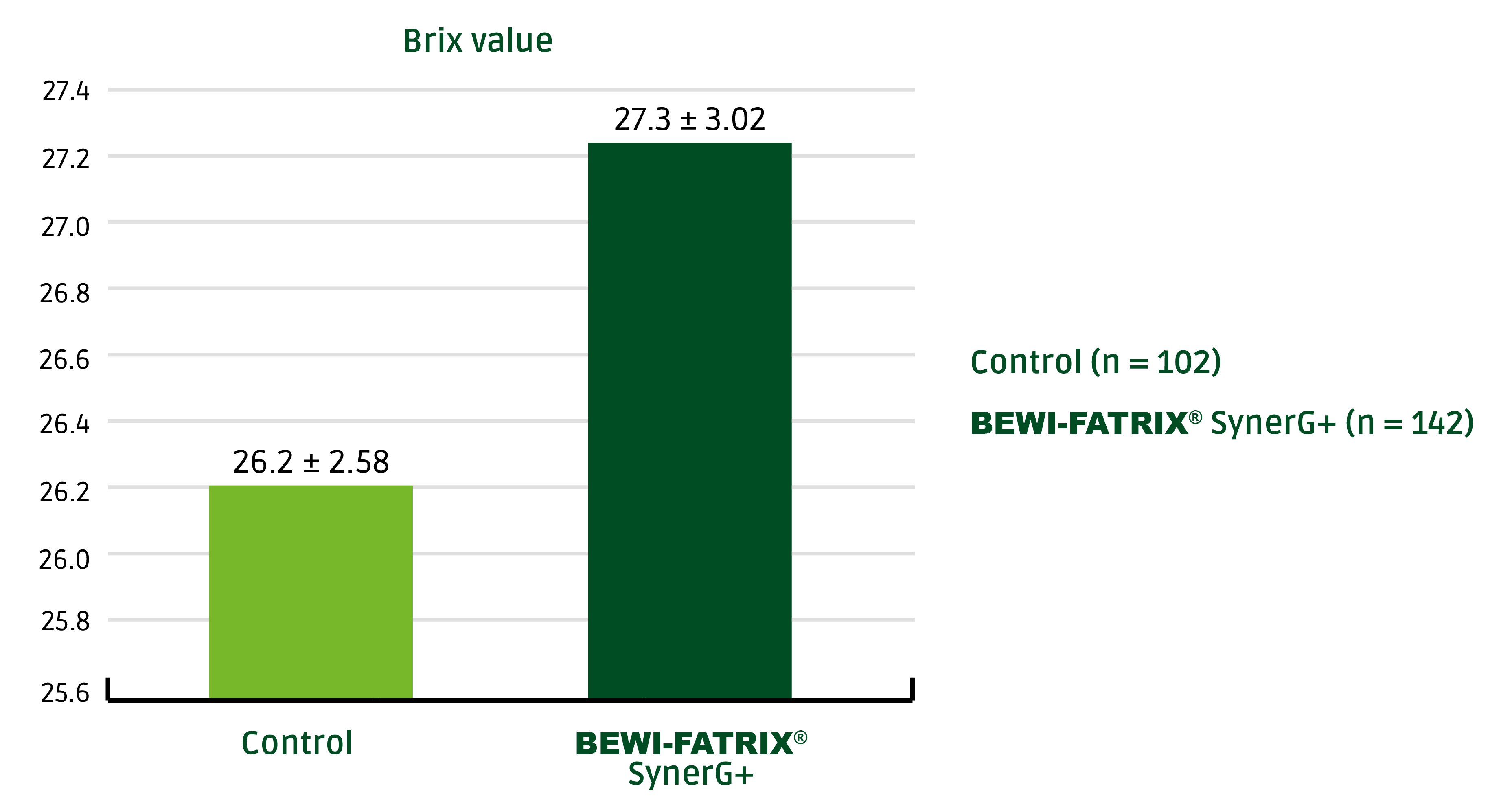BEWI-FATRIX® SynerG+ increases colostrum quality
Piglets are born without maternal immunity. Therefore, earliest colostrum intake is essential for newborns. Due to the placental barrier, they are born without maternal antibodies. This means they do not have any protection against infections or diseases direct after birth. For this reason, an immediate as well as adequate supply of colostrum is not only essential but also plays a decisive role in farrowing management.
However, litter sizes are increasing and the amount of colostrum per piglet may be insufficient. Particularly the lighter and later born piglets receive less colostrum and as a result, their starting conditions are worse. In the case of large litters or sows with lower-than-average colostrum production might soon cause a deficit of colostrum for the suckling piglets.
Nutritional importance of colostrum
For neonate piglets, colostrum is an essential source of immunoglobulins, especially immunoglobulin G (IgG). Colostrum is the primary source of antibodies for piglets. Piglet survival may be threatened by a paucity of colostrum consumption and a low IgG level in sows’ colostrum. This is one of the reasons why, piglet mortality during lactation is still a problem in commercial swine herds worldwide and ranges from 11% to 24% according to country.
Especially neonatal mortality is correlated to a low colostrum intake, with at least 50% of pre-weaning deaths occurring within the first 3 days. Therefore, low colostrum intake appears to be a major cause of neonatal death. The roles of colostrum for piglet’s thermoregulation, immunity and intestinal development are well established. Although piglet growth and survival are influenced by piglet birth weight, colostrum intake is also determinant for piglet survival. Colostrum provides piglets with the energy necessary for thermoregulation and body growth and IgG. During the first 24 hours of life, colostrum consumption is essential for the passive transfer of immunity. The required intake per piglet is 200 – 250 ml to provide enough IgG for decent protection and reduced mortality.

Colostrum – the sooner the better
Sow’s produce in average 3.4 to 4.0 kg colostrum. Although the factors influencing sow milk production have been studied for a long time, few studies have focussed on the factors determining colostrum production. Studies suggest that litter size may not have any influence on colostrum yield. This implies that by an increasing litter size the colostrum amount per piglets is declining.
In contrast to colostrum production, colostrum quality is analysed intensively. It is well known that the IgG content is declining rapidly after the birth process has started. The earlier the piglets consume colostrum, the better. If the parturition process takes longer, it is advised to implement suckling groups to spare the limited amount of colostrum for the later born and have a more even distribution among the entire litter. Besides declining IgG content after birth, furthermore the absolute content of immunoglobulins varies among sows. This is related to e.g., parity, feeding regime, vaccinations, and environmental conditions among other.

Brix refractometer to estimate colostrum quality
The colostrum quality can be estimated on-farm using a Brix refractometer. The refractometer will measure the light’s bending as a result of protein in the colostrum sample. To calculate the quantity of IgG in colostrum, the refractometer measures the amount of light that is being bent and the outcome is shown in Brix. The measured Brix value is directly correlated to the IgG level. A higher brix value means a higher IgG level. The table shows the corresponding IgG values based on the Brix measurement and the derivation on the colostrum quality of sows.

Field trial: Effectiveness of BEWI-FATRIX® SynerG+ on sows’ colostrum quality
It is described that medium chain fatty acids improve the development of mamillary glands. To analyse the effectiveness of BEWI-FATRIX® SynerG+ on sows’ colostrum quality, a trial was conducted on a practical farm with 500 sows in the Netherlands. Both groups, trial group and control group, received the standard lactation feed of the farm. In the trial group BEWI-FATRIX® SynerG+ was added 7 days pre- and 4 days post-partum as a top dressing to the lactation feed with 12 grams per sow and day. After farrowing colostrum quality was measured by Brix refractometer. Sample collection of sow’s colostrum and measurement of colostrum quality was done 4 hours after starting of farrowing based on Hasan et al. (2016). In total 244 litters were taken into account.

Results: BEWI-FATRIX® SynerG+ increases colostrum quality directly after farrowing
The results show a strong effect on colostrum quality. By addition of BEWI-FATRIX® SynerG+ the average Brix value increased with 1.11 points from 26.2 to 27.3. The pre-weaning mortality in the trial group was improved from 11.2 % to 8.1 % and the litter weight at weaning was 2.20 kg higher compared to the control group.
The trial clearly shows that the addition of BEWI-FATRIX® SynerG+ was able to increase colostrum quality directly after farrowing. The product can positively influence the quality of sow’s colostrum in a natural way. As the colostrum amount per piglet becomes more critical in larger litters, this higher IgG content is given the piglets a better start. The better colostrum quality leads to healthier piglets, which is shown in reduced mortality and higher weaning weight. The application of a pure plant-based product in a targeted combination of ingredients creates synergistic effects that lead to a significant reduction of medication on the farm.
